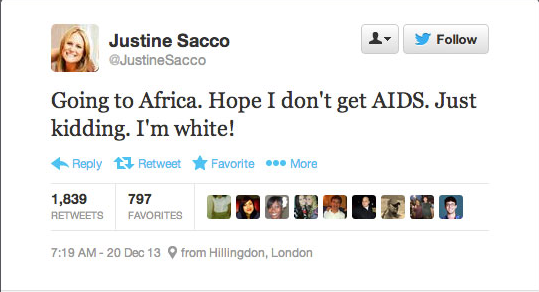Don’t Be Stupid: Social Media Can Get You Fired
It’s time to grow up and face the fact that social media, or what you say in social media channels specifically, can get you fired. This is a message that I “try” to get across to University students and professionals that I coach on best practices for social media, PR and media relations. Unfortunately not enough practitioners focus on this message!
If there is one thing that we can take away from 2013, it is the fact that using social media can get you in trouble if not careful. In the first quarter of the year we saw what many deemed a “shit-show-in-progress” when Adria Richards, was attending a developer conference and not only tweeted about being offended by sexists comments made by two male attendees, but tweeted a picture of the offenders. Long story short, plus you can read the story in the link provided, the two men making the comments were fired, as was Adria. There are many lessons to be learned from these events and some to be taken very seriously, but I will save those for another blog post. The focus of this post is that a single Tweet can cause an avalanche that can’t be stopped.
Let’s look at the latest Tweet fiasco. If you haven’t heard about Justine Sacco, I don’t know where you have been. Her now infamous Tweet and her actual Twitter account have been deleted. In fact, it has been reported that she has deleted or suspended all of her social accounts. Despite this, the now infamous Tweet lives on. Did Sacco make a mistake? The obvious answer is yes. The court of public opinion has ruled on that. Her one Tweet resulted in her being publicly called out, humiliated, fired and her social accounts taken over by people around the globe calling for action, some even threatening her. Did she deserve to be threatened? No. She did not. Should she have known better? The answer is yes. She was the Director of PR for a pretty well known company. I am sure that this holiday season is taking on a whole new period of reflexion for her. She has lost her job. She had to shut down all her social accounts. She is infamous. She has had to publicly apologize for her error in judgement. Despite her apology, people continue to Tweet to her and about her. The Tweets are less than kind.
When coaching clients I hope to help them understand that social media is public. You may only have a small number of followers or friends on social, but the fact of the matter is that it is public. Sacco apparently only had a few hundred followers. She clearly didn’t think about the worldwide impact that 12 words would have.
The key take away from these actions is quite simple: when you share your thoughts in social media, you are “publicly” sharing information. What you might think is funny or light-hearted or even informative could actually be offensive and perceived as insensitive and hateful. Before hitting “send”, “share” or “Tweet”, pause and reflect. Think about what “could” happen.
Now the questions is: Do you feel sorry for Justine Sacco? Why or why not?



